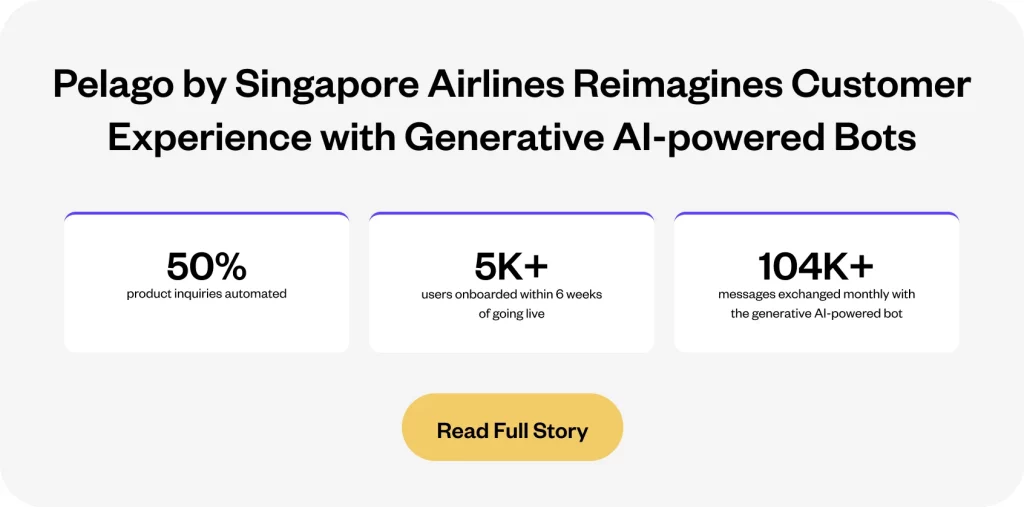Executive summary
Exploring the intricate world of customer service within the Business Process Outsourcing (BPO) industry, this comprehensive blog explains its vital role in shaping business trajectories. We explore the essence of BPO customer support, decoding its methodologies and substantial impact on organizational growth. This blog navigates through the core of customer service in BPO, analyzing its structure, significance, and the decisive question for businesses: the necessity of BPO in their customer service strategy. This blog will provide businesses with insightful clarity on leveraging BPO services for amplifying customer relations.
Envision a corporate scenario where every customer interaction is a journey of trust, satisfaction, and loyalty. It is the transformative power of customer service in the BPO sector. Today’s businesses are increasingly recognizing the indispensable role of BPOs in enhancing customer experience. When customer feedback can make or break a brand, mastering the nuances of BPO customer service is a strategic necessity for survival and growth.
As we explore everything about BPO customer service, we find a landscape rich with opportunities and challenges. Here, every conversation is a chance to build lasting relationships and enhance brand loyalty. With studies showing that 70% of customer journeys are defined by how the customer feels they are being treated, the role of BPOs in shaping these experiences becomes clear. This blog aims to elucidate customer service in BPO and also to guide businesses in recognizing its value and deciding if it aligns with their strategic goals. Read on as we unfold the layers of BPO customer service, revealing its pivotal role in crafting the future of business-customer relationships.
Related must-reads:
What is customer service in the BPO industry?
Customer service in the BPO (Business Process Outsourcing) sector is a critical lifeline. It’s where expertly trained teams operating from external service centers manage customer interactions on behalf of various businesses. It includes everything from answering product queries to resolving complex service issues. It often happens across multiple channels like phone, email, and social media. It’s a vital cog in the machinery of modern customer relations, ensuring that businesses can focus on their core competencies while expert hands handle their customer interactions.
Related read: Should your business outsource customer service?
Picture a bustling call center where a diverse team of agents, fluent in the language and nuances of customer service, navigate through calls and messages. They ensure that each customer query, whether a simple product question or a detailed service complaint, receives the attention and resolution it deserves.
Statistics show that around 80% of customers consider the experience a company provides to be as important as its products or services. This stat highlights the immense value of proficient BPO services.
Customer service BPOs operate as an extension of a business’s arm, providing an experience that can significantly influence customer loyalty and brand perception. The role of these BPOs becomes strategic in today’s age, where a single negative review can sway public opinion. They are crafting experiences and building relationships. Moreover, they are the customers’ first and most lasting impression of a brand. By outsourcing to a BPO, businesses can achieve a level of service consistency and expertise that might be challenging to maintain in-house. It is especially true for companies scaling rapidly or operating in highly competitive markets.
The role of generative AI chatbots in BPO industry
Generative AI chatbots are emerging as game-changers in the BPO industry. They are transforming the landscape of customer interactions. These advanced AI systems are more than just tools; they are reshaping the customer service narrative with their ability to understand, respond, and evolve.
Let’s explore how generative AI chatbots are significantly impacting the BPO industry and why they are becoming an indispensable asset for businesses striving for customer service excellence.
1. Adapting to customer needs with precision and agility.
Firstly, generative AI chatbots bring an unprecedented level of automation to customer interactions. It significantly enhances the efficiency of BPO operations. These AI-driven chatbots can handle a vast range of routine queries, from basic product information to complex troubleshooting guides. According to a study, the instant gratification offered by chatbots and virtual assistants is preferred by 90% of today’s picky customers.
This capability allows human agents to focus on more intricate and nuanced customer issues, where a personal touch is indispensable. For instance, a BPO handling customer support for an ecommerce platform can deploy AI chatbots to address common queries about order status, return policies, or shipping details. That will reduce the queue for live agents and ensure faster resolution times.
2. Personalization at scale
Generative AI chatbots can learn and adapt. It allows them to continuously improve the quality of interactions based on customer feedback and evolving business needs. They can analyze vast amounts of data to identify patterns, preferences, and pain points. That lets them offer a more personalized and targeted approach to customer service. This level of customization was previously only achievable through human intervention.

3. 24/7 customer support and global reach
Integrating generative AI bots in BPOs significantly boosts customer satisfaction by offering 24/7 support. This round-the-clock availability means that customers can receive instant assistance at their convenience. AI chatbots can engage customers in multiple languages, breaking down linguistic barriers and expanding the reach of businesses globally. For businesses, this translates into broader market penetration, higher customer satisfaction scores, and a more substantial brand reputation.
Transform your customer service today with Yellow.ai

6 Key benefits of customer service in BPO
Customer service in Business Process Outsourcing (BPO) presents various benefits crucial for businesses aiming to establish a strong foothold in today’s competitive market. Below are the key benefits of integrating customer service in BPO and how it can transform businesses.
1. Increase customer retention
Customer retention is a critical factor in the BPO landscape. The ability to keep customers returning hinges on the quality and efficiency of service provided. A BPO’s skillful handling of customer interactions can significantly reduce churn rates. That is because customers who receive timely and effective responses are more inclined to stay loyal. For instance, a BPO handling a telecom company’s customer service can effectively resolve issues, leading to a noticeable decrease in customer attrition.
Related read: Customer Retention: 15 Strategies to Improve CR
Here is how businesses can implement it:
- Establishing a robust follow-up system to ensure customer satisfaction post-resolution.
- Customizing interactions based on customer history to create a more personal and engaging experience.
- Continuously monitoring customer satisfaction metrics to identify areas for improvement.
2. Boost customer satisfaction ratio
Customer satisfaction is the barometer of success in customer service. BPOs, with their expertise and resources, are adept at elevating the customer satisfaction ratio by addressing concerns efficiently and empathetically. A satisfied customer is more likely to become a repeat client and recommend the business to others. It will boost the company’s market reputation and profitability.
Related read: How to improve customer satisfaction in 2024?
Here is how to implement it:
- Implementing quality assurance protocols to ensure every interaction meets the highest standards.
- Regular training sessions for agents to handle diverse customer scenarios with proficiency and empathy.
- Leveraging customer feedback to refine and enhance service strategies continually.
3. Deliver high-quality service in real-time
Customers expect immediate responses in today’s business world. BPOs equipped with advanced technologies and skilled personnel can deliver real-time solutions. It sets a business apart from its competitors. For example, a BPO serving an online retail company could use live chat and AI-driven tools to respond instantly and accurately to customer inquiries. As a result, it significantly enhances the customer experience.
Here is how businesses can implement this:
- Utilizing real-time communication channels like live chat, social media, and phone support.
- Incorporating AI-driven tools for immediate query recognition and response generation.
- Streamlining processes to minimize response time and maximize efficiency.
Related read: Enhance Your Customer Service with the Benefits of Live Chat Support
4. Enhance customer lifetime value (CLTV)
BPOs play a crucial role in enhancing the CLTV by offering exceptional service that encourages repeated interactions. A customer who perceives value in the service is likely to continue the relationship. That will increase the customer’s lifetime value to the business. A well-executed BPO strategy leads to repeat purchases and loyalty, which are critical drivers of CLTV.
Here is how you can implement it simply:
- Developing loyalty programs and personalized offers based on customer interaction history.
- Analyzing customer data to identify trends and tailor services accordingly.
- Establishing a feedback loop to improve the customer experience continuously.
5. Improve customer loyalty
Customer loyalty is the cornerstone of long-term business success. BPOs foster loyalty by consistently delivering high-quality service, understanding customer needs, and exceeding expectations. Loyal customers are not merely repeat buyers; they are advocates who spread positive word-of-mouth, contributing significantly to business growth.
Below are simple steps to implement it:
- Implementing customer recognition and appreciation programs.
- Encouraging and rewarding customer referrals to leverage word-of-mouth marketing.
- Ensuring transparency and honesty in all customer interactions to build trust.
6. Positive word of mouth
Positive word-of-mouth is a powerful marketing tool, and BPOs can be instrumental in generating it. By providing exceptional service, BPOs create happy customers who are likely to share their positive experiences with others. As a result, it can attract new customers and enhance the brand’s image in the market.
Here is how you can implement it:
- Encouraging satisfied customers to leave reviews and share their experiences online.
- Engaging actively with customers on social media to amplify positive interactions.
- Training agents to focus on creating delightful experiences that customers would want to share.
Experience future customer service with Yellow.ai voice automation
Imagine a world where every customer interaction is an experience that resonates. That is the promise of Yellow.ai’s advanced voice AI technology. Experience the seamless combination of human-like interaction and AI efficiency that redefines customer support.
Our dynamic voice AI agents provide immediate, precise responses across various queries and in multiple languages, ensuring no customer is left unheard. From handling intricate support requests to facilitating smooth product inquiries and purchases, our technology is here to revolutionize your customer service landscape.
Discover how Yellow.ai can empower your business to optimize cost savings, accelerate your time-to-market, and guarantee superior customer experiences around the clock. Don’t just take our word for it — see it in action.
Book a demo today and witness AI that never sounded so human.
How to improve customer service in the BPO industry?
Improving customer service in the BPO industry requires a multi-faceted approach that addresses various aspects of customer interactions. By focusing on areas like FCR, continuous training, minimizing wait times, gathering feedback, implementing best practices, customizing interactions, and prioritizing relationship building, BPOs can significantly elevate their service standards. That will lead to the overall success and reputation of the businesses they represent.
Here is a detailed look at how businesses can improve customer service in the BPO industry:
1. Enhance first contact resolution (FCR)
Customers frequently face prolonged resolution times due to multiple transfers or callbacks. It leads to frustration and dissatisfaction. However, customer service can help. The cornerstone of effective BPO customer service is resolving customer issues on the first contact. This method improves customer satisfaction and also boosts operational efficiency.
Businesses should equip agents with comprehensive knowledge and tools to resolve queries in the first interaction. Furthermore, you should implement a sophisticated CRM system for better access to customer history and preferences. Finally, ensure that you regularly analyze FCR rates to identify areas for improvement and training needs.
2. Continuously train BPO employees
Agents often lack sufficient product knowledge or soft skills. That negatively impacts customer interactions. Hence, continuous training is essential for keeping BPO staff up-to-date with the latest product knowledge, customer handling skills, and technological advancements.
Conduct regular training sessions focusing on product updates, customer empathy, and problem-solving skills. Additionally, simulate real-life scenarios in training to prepare agents for diverse customer interactions. Also, measure the impact of training through performance metrics and customer feedback.
Related read: 12 Customer service metrics to measure in 2024
3. Minimize wait times
Long hold times are a common complaint and can be detrimental to customer experience. Customers often experience long wait times before they can speak to an agent. It usually leads to frustration and potential loss of business. Hence, reducing wait times is crucial for maintaining customer satisfaction.
Businesses should implement an efficient call routing system to reduce hold times. Furthermore, use AI-powered tools like AI chatbots to handle routine inquiries, freeing up agents for more complex issues. Monitor call queue metrics to identify peak times and adjust staffing accordingly.
4. Gather customer feedback
BPOs may miss critical insights into customer preferences and pain points without proper feedback mechanisms. Actively seeking customer feedback is vital for continuous improvement in service quality. It provides insights into customer needs and expectations.
Use post-interaction surveys to gather customer feedback. You should also analyze feedback to identify trends and areas needing improvement. In addition, regularly update service protocols based on customer insights.
5. Implement superior customer service practices
Inconsistent service standards can lead to varied customer experiences and dissatisfaction. Hence, adopting best practices in customer service is vital to excelling in the BPO industry.
Establish a set of best practice guidelines for customer service. In addition, regularly review and update these practices based on industry trends and customer needs. Conduct workshops and seminars to train agents on these best practices to enhance them further.
Related read: Top 10 customer service tips for 2024: Elevate your support
6. Customize interactions
Generic responses can make customers feel undervalued and lead to a disconnect. However, personalizing interactions can significantly enhance customer experience in BPO settings.
Use customer data to tailor interactions and offer personalized solutions. Train agents to use a customer’s history to make interactions more relevant and engaging. Furthermore, implement CRM tools to facilitate easy access to customer data for personalization.
7. Prioritize relationship building
Impersonal interactions can prevent the development of a loyal customer base. Therefore, building strong, personal relationships with customers is vital for long-term loyalty and satisfaction.
Encourage agents to engage in meaningful conversations with customers. Furthermore, recognize and reward agents who successfully build strong customer relationships. Foster a culture that values and prioritizes customer relationships.
How Yellow.ai can elevate your customer service team in the BPO industry
Businesses face the challenge of providing exceptional, round-the-clock support in the evolving domain of BPO customer service. That is where Yellow.ai steps in. We revolutionize the customer service landscape with our cutting-edge technology. Imagine deploying AI-driven chatbots and voice bots that respond with remarkable accuracy and speed and do so in multiple languages, catering to a global customer base.
Yellow.ai’s technology stands out in BPO customer service, offering:
- Dynamic voice AI agents: Experience the fusion of human-like empathy and AI efficiency. Our voice bots engage customers with natural, intuitive conversations, driving satisfaction and loyalty.
- Multilingual capabilities: Break language barriers and connect with customers worldwide. Our AI chatbots and voice bots communicate effectively in over 135 languages and dialects, ensuring no customer feels left out.
- 24/7 availability: Empower your customer service with non-stop support. Our AI solutions work tirelessly to ensure your customers are always heard, regardless of time zones.
- Seamless integration: Easily integrate our technology with your existing systems. Our solutions are designed for hassle-free adoption, enhancing your service capabilities without disrupting your workflow.
- Automate the customer service in your BPO by employing an advanced Dynamic Automation Platform (DAP). You can experience 60% automation within a month.
Embrace the future of customer service with Yellow.ai’s innovative solutions tailored to enhance your BPO operations. Elevate your customer experiences, optimize costs, and stay ahead in the competitive market.
Case studies: Real-world success with Yellow.ai

Hyundai boosts revenue and improves customer service with AI automation
Explore how Yellow.ai’s automation led to ~1000 car sales, a 10% retail conversion rate, and over 1.4 million user impressions

Pelago reimagines customer experience with generative AI powered conversational AI agents
Within a mere six weeks of going live, Pelago not only onboarded over 5,000 users but also achieved a striking 50% deflection rate!
The final thoughts
The landscape of customer service in BPO is rapidly changing. Businesses must adapt to these changes, not just to thrive but to stay relevant. The key lies in understanding customers’ evolving expectations and harnessing the power of technology to meet these demands.
The future of BPO customer service is poised for exciting advancements. We anticipate a world where AI-driven solutions and human expertise blend seamlessly to offer unparalleled service experiences. This synergy will enhance customer satisfaction and redefine how businesses view and manage their customer service operations. As we move forward, embracing innovation and staying adaptable will be the cornerstone of success in the BPO industry.
Frequently asked questions (FAQs)
What is the difference between a BPO and a call center?
A Business Process Outsourcing (BPO) organization is a broad-spectrum service provider covering various business functions like customer support, finance, HR, and more. In contrast, call centers are specialized setups focusing primarily on handling customer calls, whether for support, sales, or technical assistance. Essentially, while call centers are a subset of BPO services, BPOs offer a more comprehensive range of business solutions beyond just telephone-based customer interactions.
What are the common challenges faced in BPO customer service?
BPO customer service teams often grapple with high-volume communication, maintaining quality across different channels, overcoming language barriers in global operations, ensuring data security, and integrating new technologies smoothly into existing systems.
What are the key metrics to measure customer service performance in BPO?
Key performance indicators include First Contact Resolution (FCR) for measuring problem-solving efficiency, Customer Satisfaction Score (CSAT) to understand client happiness, Average Handle Time (AHT) for operational efficiency, Net Promoter Score (NPS) for customer loyalty insights, and Employee Satisfaction, which indirectly affects customer service quality.
How can technology enhance BPO customer service?
Technological tools like AI chatbots and CRM software streamline routine tasks, offer personalized customer interactions, provide actionable data insights, and manage resources more effectively, thereby elevating the quality and efficiency of customer service in a BPO.
What are the trends shaping the future of customer service in BPO?
We’re seeing a move towards AI-driven personalized communication, omnichannel support for a unified customer experience, data analytics for informed decision-making, and a stronger focus on training and engaging BPO staff to enhance service quality.



























